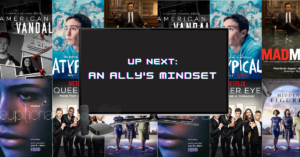In light of recent events and the ongoing social unrest across the country, many of us are investigating ways to become better allies. However, it is important to recognize that we can learn about injustice and the impact of privilege from more than just the news and earth shatteringly intense biopics. In everything that we do, we can choose to be someone who is willing to be critical of “the norm”, takes their own time and resources to educate themselves, and recognizes that their privilege often insulates from identifying inequity. To invoke this “ally’s mindset” ask yourself the following questions while watching, reading, or listening to, well, anything:
- How would this situation be different if the protagonist was a BIPOC and/or in a different socioeconomic class? Would the “bad boy” lead from American Vandal still be given the time of day to prove himself innocent if he was Black? Would the star quarterback from Euphoria still be walking around a free man if his father didn’t own half the town? Privilege and circumstance, not legitimate virtue, are often what separates us from consequence.
- What more can I learn about the underrepresented population being featured? Oftentimes, film and television are our first real interface with a minority group. Push yourself to go beyond the narrative that one story is telling, and research to find out more about the dimensions of that group, their successes, their struggles, and what you might be able to do to advocate for their liberty and inclusion. I guarantee you
won’t learn everything you need to know about people on the autistic spectrum from Atypical, or all things LGBTQ+ from Queer Eye. - How might this issue of the past have a lasting impact? Historical fiction is all the rage, and that gives us a unique opportunity to immerse ourselves in a different time and place. While you’re at the edge of your seat enjoying Don Draper’s antics in Mad Men, think about how much (or how little) has changed for women in corporate America. Please, be inspired and heart-warmed by the powerful story of Hidden Figures, but don’t you dare think that the institutional obstacles and attitudes of white supremacy and the patriarchy that oppressed those women disappeared in 1961.

These questions aren’t meant to suck the fun out of life. They’re meant to help you unlearn the inequities that you may have grown to accept as fact, and to encourage you to see that even the things and people we love have room for improvement.
Even on other planets and in alternate universes, no story is independent of the systems of privilege and prejudice that plague our reality. This is often a beautiful thing that creates multidimensional characters, complex humor, and resonant plot lines. On the other hand, this can also romanticize real issues, and diminish the perceived severity and prevalence of prejudice to those that don’t experience it. We all have a responsibility to reflect on the stories we are told, and to exercise our muscle of socially conscious critical thinking, as we work towards a more just world that is inclusive, representative, and supportive of all its inhabitants.
